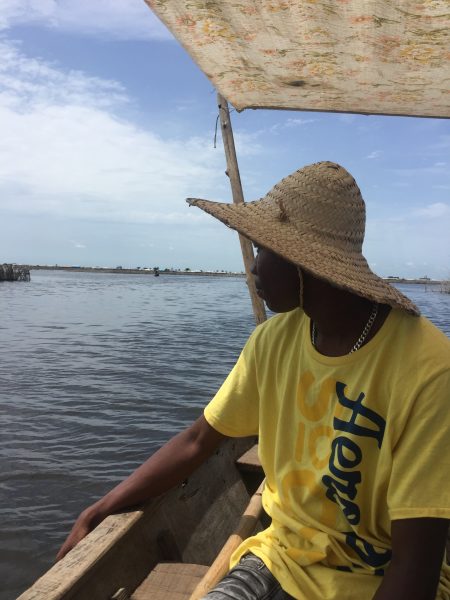
Contents
- Helpful things and tips to know before you travel to Benin
- Visas to Benin
- Cost of a visa to Benin
- Visa Touristique Entente in Benin?
- Vaccinations and medications you need to enter Benin:
- Getting around: transportation in Benin (overview and costs):
- Hitchhiking in Benin:
- Getting money from ATM machines in Benin and the big problem…
- Drinking water in Benin
- Traveling Benin on a budget: general cost of hotels, meals, tours etc.
- Wow it is hot in Benin…some Benin travel advice about the heat:
- The languages of Benin and speaking French:
- Other travelers you will meet during your trip to Benin:
- Religion in Benin
- Sim Cards, Data, and the Internet in Benin
- Everyone will ask for your phone number.
- Is traveling in Benin safe?
- Some final travel tips and things to know for your trip to Benin
- I hope that these travel tips will help you have a great trip to Benin!
Helpful things and tips to know before you travel to Benin
Whether you are backpacking across Benin or just transiting through, I have compiled a list of things I learned from my own solo travels in Benin that may be helpful for you! I address the question “Is Benin safe?” I also will discuss the cost of travel to Benin and other travel tips.Also be sure to check out my Solo Female Travel in Benin post and my Benin Travel Guide and Itinerary
There isn’t so much detailed information about traveling to Benin available online (especially in English). So I hope you enjoy my Benin travel tips! Also, if you happen to be a woman traveling alone to Benin, consider checking out my Solo Female Travel in Benin guide! Also, this guide may be helpful for those of you who are traveling to other West African Countries. I found a lot of similarities between some places with regards to ATM machines and transportation logistics. So here we go, here are my Benin travel tips!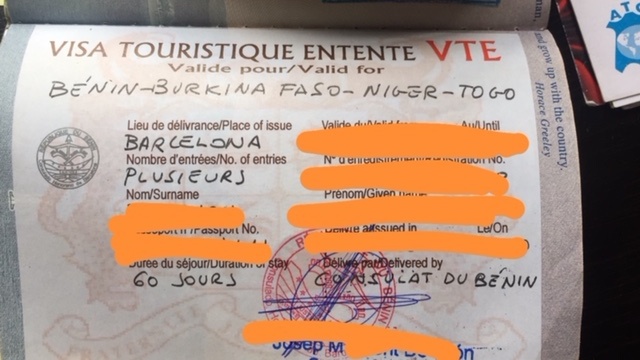
Visas to Benin
Nationals of most African countries can enter Benin visa-free for up to 90 days, but most other nationals will need a visa. Email your nearest consulate of Benin to be sure if you need a visa or not. European and North American passports (since you people seem to be my blog’s primary audience) will need visas to Benin. Benin recently changed to an E-visa that you can apply for online before your trip. This eliminates the need to go to the consulate to get a visa to Benin! In fact, I got one of the last visas at the Consulate of Benin in Barcelona. Generally they won’t even give you a visa at the consulate anymore. You must apply for your visa to Benin online. This is the official website to apply for an E-visa to Benin. You can find a link to the Benin E-visa website on all the consulates’ websites as well. Be sure that you are at the official website and not a third party website!Cost of a visa to Benin
A 30 day, single entry visa to Benin costs 50 Euros. A 30 day, multiple entry visa to Benin costs 75 Euros. A 90 day, multiple entry visa to Benin costs 100 Euros. The E-visa can be approved in sometimes under 48 hours, though it is recommended that you apply for your visa a little farther in advance to avoid complications.Visa Touristique Entente in Benin?
If you somehow manage to get a Visa Entente (supposedly valid in Togo, Benin, Burkina Faso, Côte d’Ivoire, and Niger), then it should work in Benin. But note that the Visa Entente to West Africa is pretty much dead as of 2018. You used to be able to get it at the Consulate of Benin in various European cities, but now they aren’t issuing it due to the E-visa program. It is also not available at embassies in Accra, Ouagadougou, Niamey, nor Cotonou. The Lomé airport website says it is possible to get one in Lomé but I personally cannot confirm that! It’s a shame because the Visa Entente was a great way to save money on the sometimes pricey visas in the region. Check out my experience traveling with the Visa Entente here!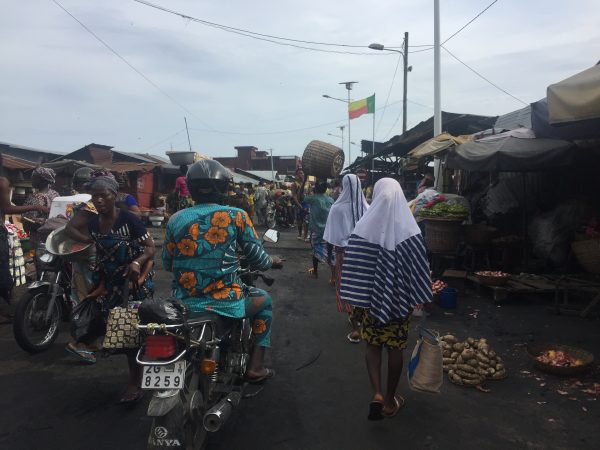
Vaccinations and medications you need to enter Benin:
When you arrive at the Cotonou airport, officials ask to see your Yellow Fever certificate immediately after you get off the plane. They want to see it even before checking your passport! While Yellow Fever is the only vaccine that is explicitly required to enter Benin, vaccines for Hepatitis A and B, typhoid, rabies, and meningitis are also recommended but not enforced. I have all of those, except for the rabies vaccine. It is also recommended that you take antimalarial pills when you visit Benin. See Also: Should I take antimalarials? Although I never got sick, having something to treat traveler’s diarrhea may also be helpful if you get food poisoning!Getting around: transportation in Benin (overview and costs):
In the cities, you will most likely use Zémidjans (zemi-Johns) or Zems for short. These are the motorcycles that are always zipping around all over. The Zem drivers will be wearing a yellow vest and are technically the only people allowed to transport you. What should you pay for a Zem ride in Benin? Well, technically it should cost 200-500 CFA. But if you’re obviously a tourist like me then you’ll be expected to pay more. Sometimes they would try to get me to pay 2000 CFA for just a short ride! Expect to haggle and if you get it between 500 and 1000 you’re doing pretty good! My most important Benin travel tip is to be patient!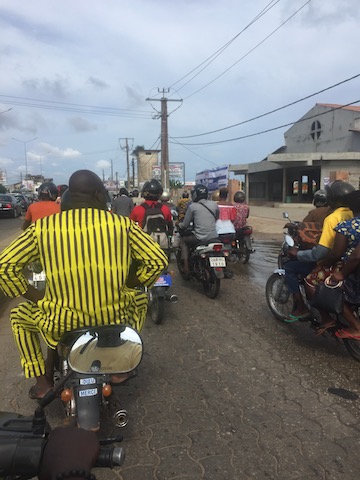
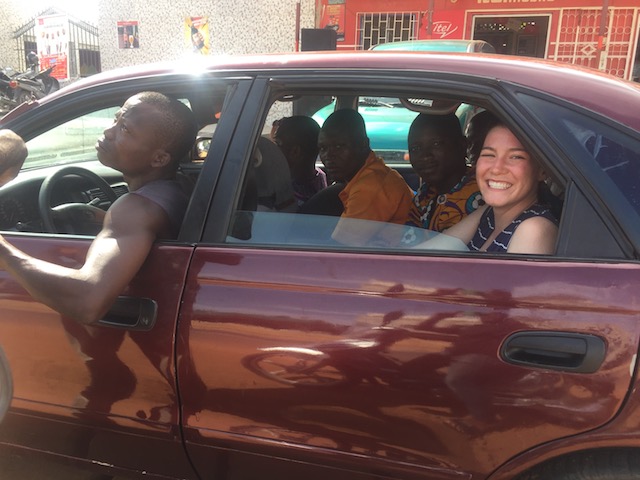
Hitchhiking in Benin:
If you plan on hitchhiking in Benin, you may end up just stopping tons of bush taxis. Once again, it seems like most of the cars going long distances are bush taxis and therefore you will be expected to pay like everyone else. If you really are vagabonding it in Benin, your best luck will be hitchhiking with big trucks. Luckily the distances aren’t too long so the slower speed of a truck shouldn’t hinder you too much. Drivers will expect a tip, though. To be completely honest in my Benin travel tip, traveling around Benin in bush taxis is really cheap and a good way to support local drivers and economies! Plus since you flag them down on the side of the road doesn’t that technically make it hitchhiking?Getting money from ATM machines in Benin and the big problem…
There are plenty of ATM machines around the airport and in all the major cities. If you are going out into the bush just prepare your cash in advance. But my Benin travel advice centers around the problem of the kind of cash you get… The problem is that when you get money from ATMs in Benin, the CFA that you get is in HUGE bills that are pretty much monopoly money. Nobody wants a 10,000 CFA note, and unless you are eating at fancy restaurants you will probably want just small change to buy water and Zem rides… Learn to guard your small change like it is gold. I found myself lying to other tourists in hotels about not having small change because I needed to save it to myself! Oops! To break up these bills, sometimes it is best to go to a big, western style supermarket to buy some things. I know…it’s lame, but it’s the easiest way! They usually will break the big bills without giving you any problems. There are also people who make their living breaking up big bills on the street for a small fee. Ask at your hotel or hostel or even in the market and someone will surely take you to meet the change person!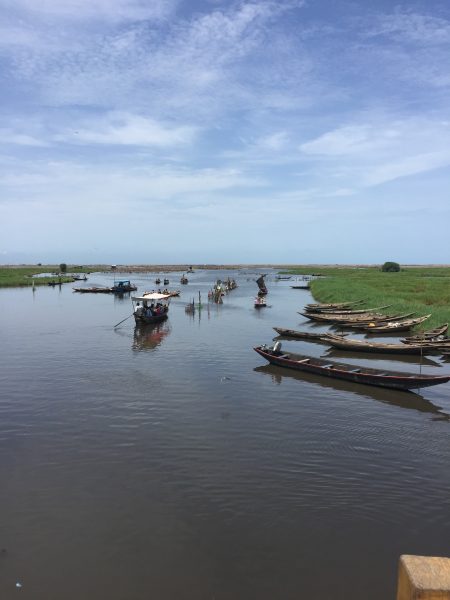
Drinking water in Benin
Can you drink the water in Benin? The water in Cotonou is technically safe to drink, but I wasn’t about to risk getting sick in that ungodly hot and humid weather! Nobody I met in Cotonou drank the water, either. So my Benin travel tip would be to avoid drinking the water in Cotonou. Otherwise, the water outside of Cotonou is not potable. So plan on buying your water. You will have two options: bottled water or water in little plastic bags (called “sachets”). Tourists are generally advised to drink bottled water since there are horror stories of badly contaminated sachets. In the end I just bought one big bottle and refilled it with sachets instead of buying new bottles. You could save a little money that way. I never got sick but I always got the sachets that all the people around me were drinking. People often have uses for the bottles so if you are throwing away your bottle ask around if someone would like to have it. You can save yourself 500 CFA usually by buying your bottled water on the street instead of in the hotels. Haha! I won’t charge you for this bit of Benin travel advice! In the end, I spent up to a few Euros each day on water. Be sure to budget that in if you are on a shoestring budget trip to Benin!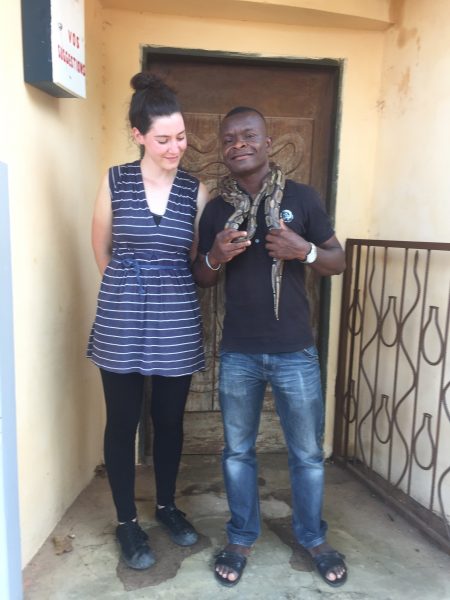
Traveling Benin on a budget: general cost of hotels, meals, tours etc.
Prices in hotels, stores, formal bus lines (not bush taxis), and sit down restaurants are generally non negotiable. Everything else is open to haggling. It is often done in good humor and if you’re a foreigner you will generally be grossly overcharged anyway. Try not to let fifty cents ruin your mood. The cost of travel in Benin is not quite as cheap as traveling in, say, Southeast Asia. If you are traveling in a group you may be able to save a lot on hotels and tours by sharing rooms. Unfortunately, traveling alone in Benin meant that I ended up spending a little more money on hotels and tours, etc. Though I would still consider Benin to be a budget destination. If you want some more Benin travel advice then I recommend traveling with a buddy to cut costs!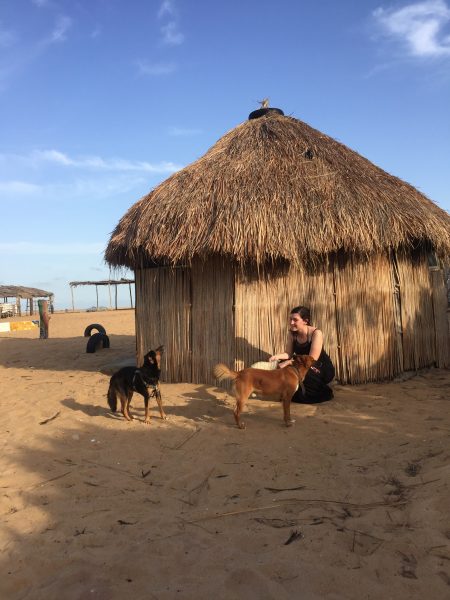
The general cost of budget hotel options in Benin to help you plan your Benin travel budget:
The cost of a simple hotel room with a fan was generally between 7,000 and 12,000 CFA (between around 15 to 20 USD). The absolute lowest price would be around 4,000 or 5,000 CFA if you are out in a tiny village somewhere. A hotel room with Air Conditioning was generally between 15,000 CFA and higher. Around 20,000 CFA (or just about 40 USD) was a typical price in a very bare bones hotel. But you could easily spend hundreds of dollars on a hotel in the bigger cities. The only place where I slept in a dorm was at Guesthouse Cocotiers in Cotonou. The rest were private rooms.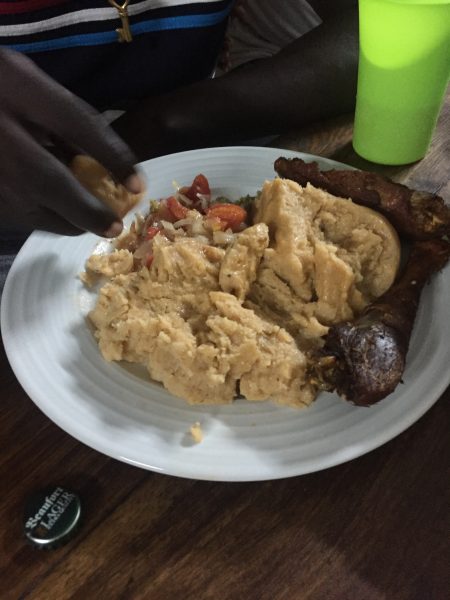
The general cost of food in Benin to help you plan your Benin budget:
Eating at restaurants in Benin was a little more expensive than I had expected when I traveled to Benin. Expect pretty much European prices at nicer, sit down restaurants in hotels or urban centers. This means from 8,000 to 15,000 CFA (16 to 30 USD) for a meal there. Any plate that included a piece of meat or fish at simpler restaurants would still be around 5,000 CFA (like 10 USD). Street food was delicious and much, much cheaper at 1,000- 3,000 CFA (2 to 6 USD) for a big plate of food! I never got sick, just be sure that the vendor protects his or her food from insects and that it is served hot. If you have access to a kitchen, buying food at markets will be very cheap! Here are some more Benin travel tips that apply to a lot of places in the world…Don’t forget to peel all vegetables and wash them with drinking water. Try to stick to fruits that you peel also.
The general cost of tours in Benin to help you plan your budget trip to Benin!
Since I was traveling alone I ended up having to spend more money on tours. Expect to pay at least 10,000 CFA (20 USD) minimum for a half day tour, but even that would be pretty low. Prices were generally around 15,000 to 20,000 CFA (30 to 40 USD) for a trip that involved canoes or motorcycles. Prices jumped WAY up once motorboats or private cars were included (think maybe around 100 USD per day or more). Also, in Benin you will be expected to offer your guide a tip at the end. You don’t need to tip me for these Benin travel tips haha.Wow it is hot in Benin…some Benin travel advice about the heat:
Be careful of the heat. I had such a bad reaction that I broke out in a heat rash all over my body. Also when I am hot I forget to eat and then that turns into more problems! It is also hard to eat because a lot of the meals are served very hot to kill bacteria! Don’t forget to always have more water than you think you need (ok ok I’m trying not to be your mother, I swear!) and always have sunscreen if you happen to be a pasty white person like me. I find that this kind is the most effective- it feels like you are putting lip balm on your face but it never sweats off!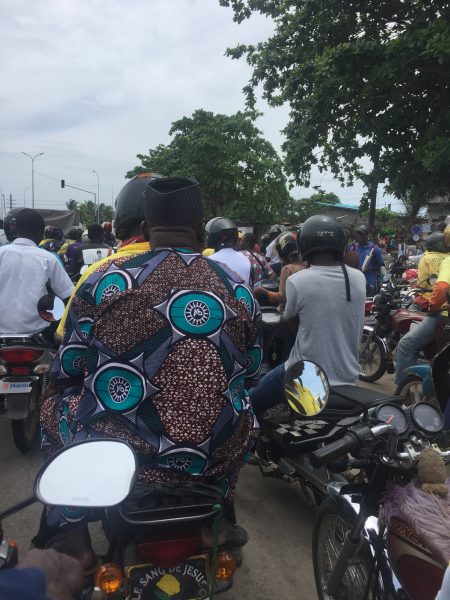
The languages of Benin and speaking French:
There are over 50 languages spoken in Benin, with some of the major ones being Fon, Yoruba, Fulfulde, and Bariba. French is the official language and is used in official papers and statements. It is also the language of the media. Of course it is always ideal to try to learn as much as the local language as you can. Although French is the official language, there are a lot of people in Benin who do not speak French. But, in my experience, very little English was spoken in Benin. That may change in the near future due to Benin’s proximity with English speaking Nigeria, but if you do not have any understanding of French you will definitely have trouble getting around. Here’s a big Benin travel tip: I really recommend either bringing a French phrase book with you or taking a little crash course in French. There are tons of free resources out on the internet! Very little English was spoken even at the major tourist sites in the country. If you don’t know a word of French I recommend looking up the history of the places you will visit before going so you will get something out of it! With that said, I did meet some travelers who didn’t speak French and were fine. Though my favorite parts of traveling around Benin were the conversations I had with the locals. I just feel like 80% of my trip would have been lost if I hadn’t spoken French!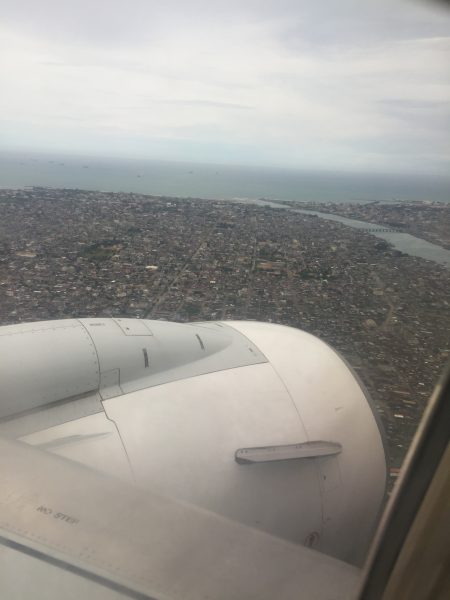
Other travelers you will meet during your trip to Benin:
There are lots of tourists and travelers in Benin who come from neighboring West African countries. It is fun to talk about cultural differences with them! There were a handful of those adventurous Japanese solo travelers who have been to 130+ countries and are full of stories yet speak just a little English or French and keep to themselves. I want to pick their brains!!!! The majority of other travelers were from France or Belgium and sometimes from Germany. But I’m making it seem like you’re at a hostel in Bangkok…there just aren’t a lot of tourists in Benin! At the other major tourist sites in the country I would maybe cross paths with one or two other backpackers, and even that was rare! The Americans you may meet in the villages are generally in the Peace Corps and have lots of awesome stories to tell and tips to give! In fact, sometimes it is fun to get waaaaaay of the beaten path and once you are in a tiny village, ask around for “the American”. Sometimes you will be brought to a hut where a 24 year old hipster from Alabama lives and the world feels like a wacky place. That was one of the most unique Benin travel tips that someone gave me!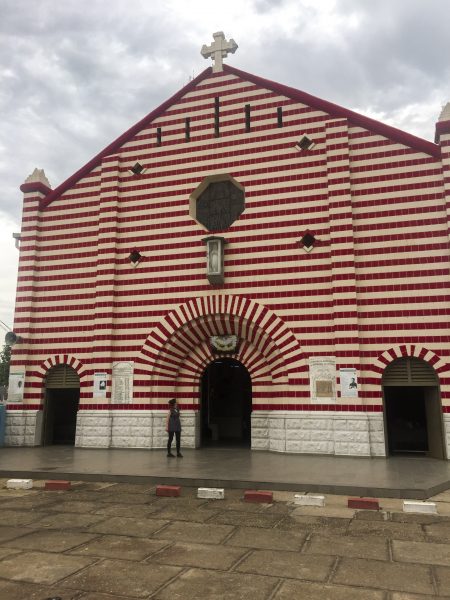
Religion in Benin
Benin is the homeland of Vodun (Voodoo). Almost 20% of the population practices Vodun. About a quarter of the population is Mulim and around 35% of the population practices some form of Christianity. Here’s a good Benin travel tip: I really recommend trying to learn as much as you can about Vodun from people who practice it in Benin. I realized that my understanding of this religion was rooted in racism! Cartoons of silly voodoo dolls, sexualized dancing, ‘evil rituals’…turns these things were all perpetuated by European slavers and their descendants out of fear and dislike of the religion of the African peoples they stole to make into slaves. The more contemporary portrayals of this religion in the mass media are often completely false and perpetuate horrible stereotypes! So I hope your trip to Benin will help you see Voodoo in a new light. Also, in Vodun people will have divinities (also can be referred to as ‘fetishes’ but a few people told me that the word fetish is sometimes considered pejorative and that ‘divinities’ is the preferred word), that may not stand out to untrained eyes. Sometimes they will be on the side of the road, or near a foot path. Why am I explaining all of this? Because you should watch your step!-
Mosque in Benin -
A Vodun market
Sim Cards, Data, and the Internet in Benin
You can easily get a sim card at the airport in Cotonou. If you are arriving by land, you will be able to buy one from any street vendor near the border. There are a few companies. Just ask around for the preferred one. I went with MTN. It is the typical African cell phone package deal where you buy a sim card and then need to buy top ups and pick data packages. You will generally have to just call a certain number (usually # and then some numbers depending on what company you use) and buy the package you want. Data is super cheap and pretty much your only internet option since outside of Cotonou there wasn’t a lot of dependable WIFI. Just have the person who gives you your SIM card walk you through the process. You will generally pay for the card and then they will make an account associated with the number and deposit money in it for you. So don’t think you were scammed if you bought a sim card and the internet doesn’t work! You have to buy a package. In my Benin travel advice I really recommend investing in a SIM card. I personally prefer just to get a data package instead of a package that involves calls and texts. Then I can just use Whatsapp if I need to message people. A LOT of people have smartphones there (more than in France for sure) and so most of them will use Whatsapp.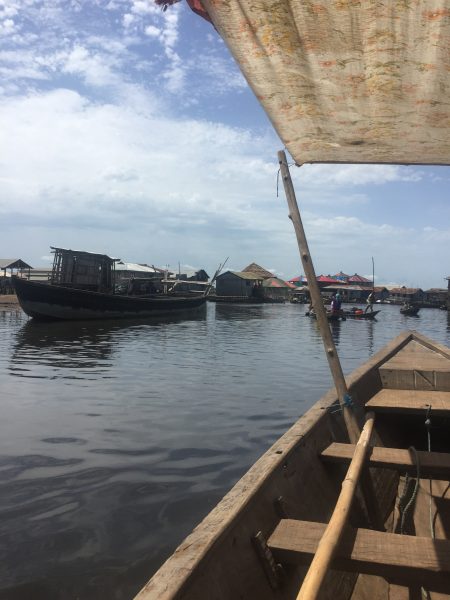
Everyone will ask for your phone number.
People ask for your number a LOT in Benin and the entire region. Someone you spoke to for 2 seconds on the street will ask for your number. Police at checkpoints will ask for your number. Someone you sat next to on a bus will ask for your number. Then they will call that number. Sometimes multiple times a day. The conversations are very friendly and usually they want to say hello how are you I’m fine have a good day and that’s it. Or it would be the equivalent but just with Whatsapp messages. I eventually was getting so many texts and calls that I felt embarrassed because I had no idea who some of the people were! Benin travel tip: think of it as a sort of “facebook friend request.” If you are from Europe or North America it may seem super weird and intimate to give out your phone number, but I eventually realized that it was super awkward for the people I met in Benin for me to refuse to give a number. It would be like saying to someone in the USA that they shouldn’t even request to be your friend on Facebook. In the end for me it was just better to give out my phone number. It seemed to be a polite way to end a conversation. Plus, you never know when that person may end up saving your butt. If you really don’t feel comfortable, just give out a fake number. But my Benin travel tip would just be to have a number ready to give!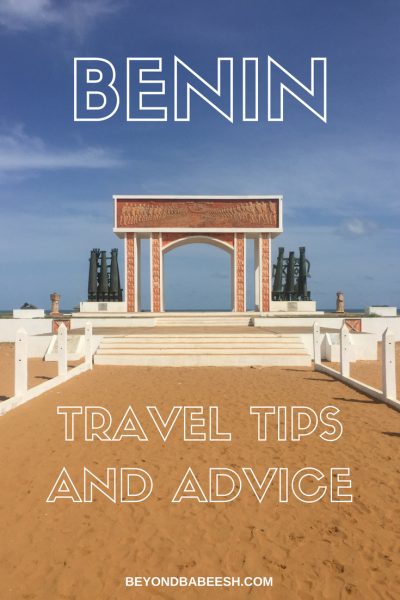
Is traveling in Benin safe?
I read a little about safety in Benin before arriving and I was just convinced that everyone would run after me and steal my stuff the moment I set foot in Benin. There isn’t a lot of information about traveling in Benin on the internet, but of the few travel bloggers who went there a surprisingly high percentage of them had things stolen. Nothing of mine was stolen in Benin. I never felt afraid or vulnerable. Nothing weird ever happened. Is it safe to travel to Benin? Is Benin safe? Will you be safe? If you are careful, I’m confident you will be fine during your trip to Benin! I put my bag in the back of bush taxis. I left it in hotel rooms. But it is important to not make yourself into a target. I recommend not blatantly walking around with valuable things. I never used my DSLR camera in cities in Benin. Though using your smartphone to take pictures anywhere is generally fine since most people there also have smartphones. Iphones are still noticed, though. I ended up putting a sticky note on the back of my phone under the case to cover the Apple logo. That’s not just a Benin travel tip either…I still have that sticky note on the back of my phone! If you do need to walk around the valuable stuff, consider putting it in a normal plastic bag instead of a fancy case. I never walk around alone at night unless I am with a trusted local or someone who really knows what he or she is doing. Use a travel pouch for your passport and cash and keep a small amount of cash in your wallet. Consider having a dummy wallet with some expired cards and a few dollars in it in case you get mugged…but I seriously doubt you would get mugged! Don’t keep all your cash and cards in the same place. Refer to my solo female travel in Benin post for more safety tips that even men may find helpful! Personally I think the most dangerous thing about being in Benin is taking overstuffed bush taxis around or riding the motorcycles around without a helmet. I think it is smart to be vigilant but you shouldn’t be too stressed about it!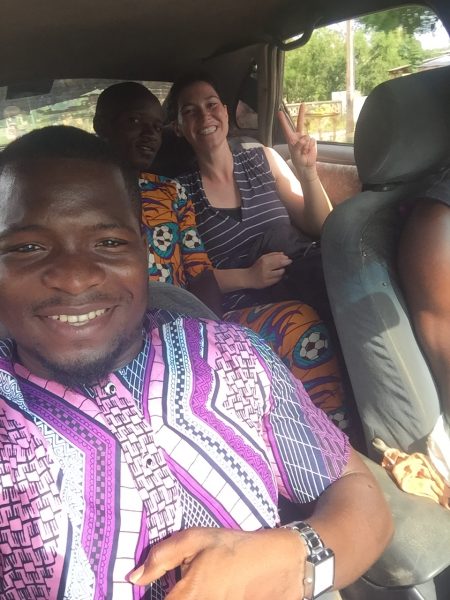
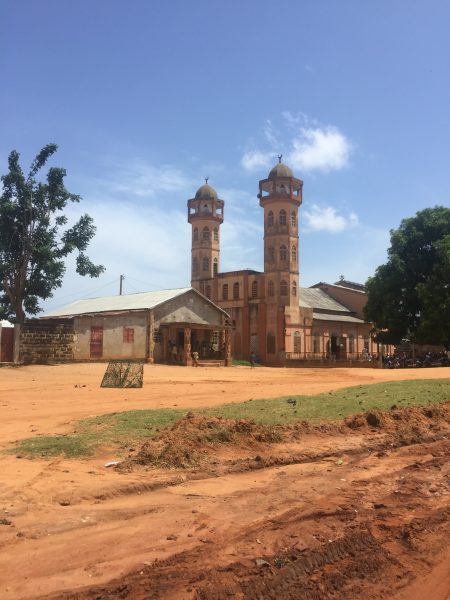
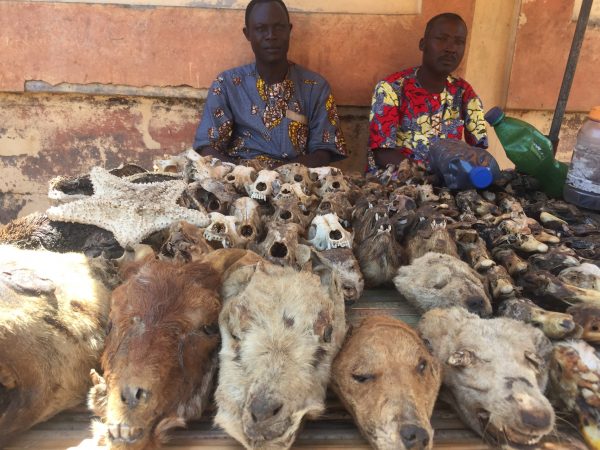
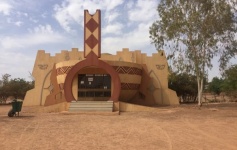
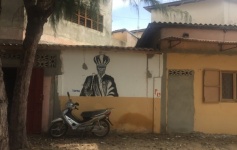
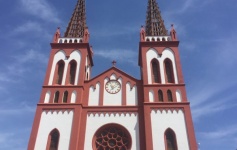
2 Comments